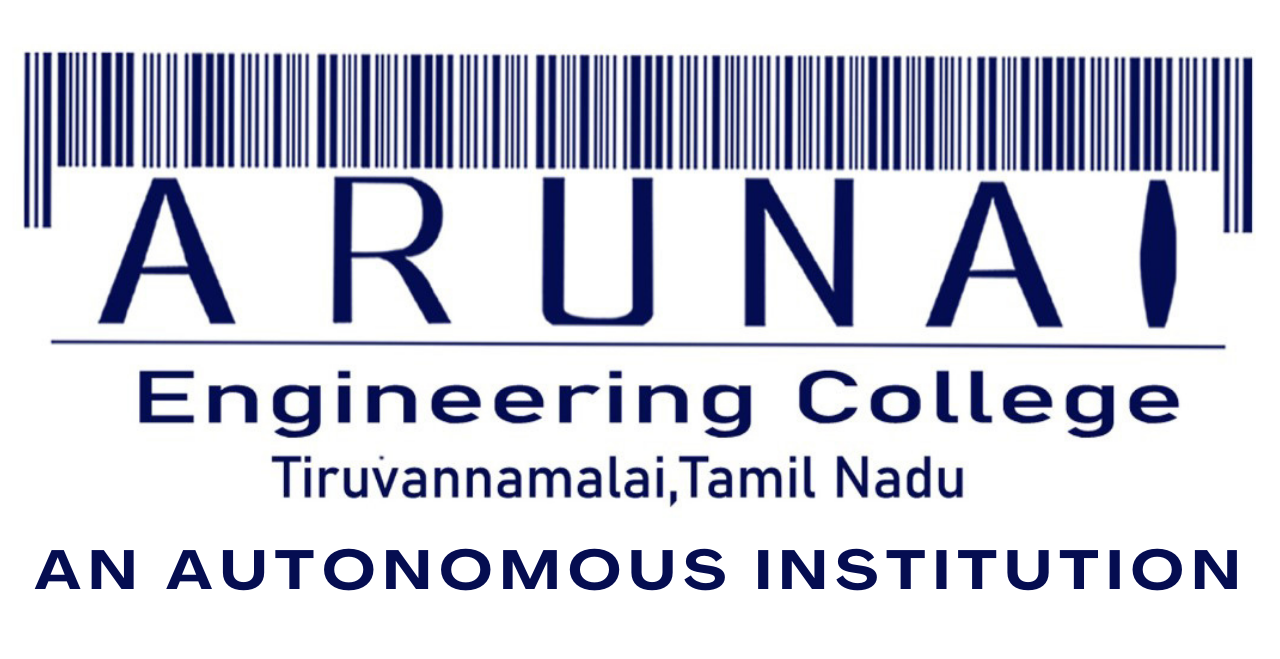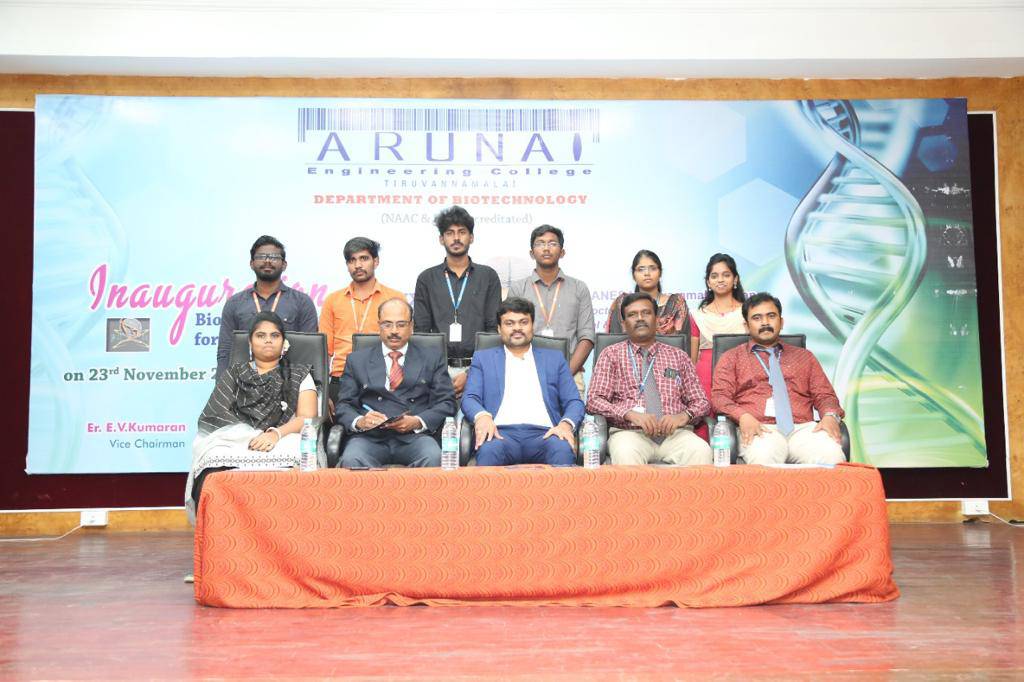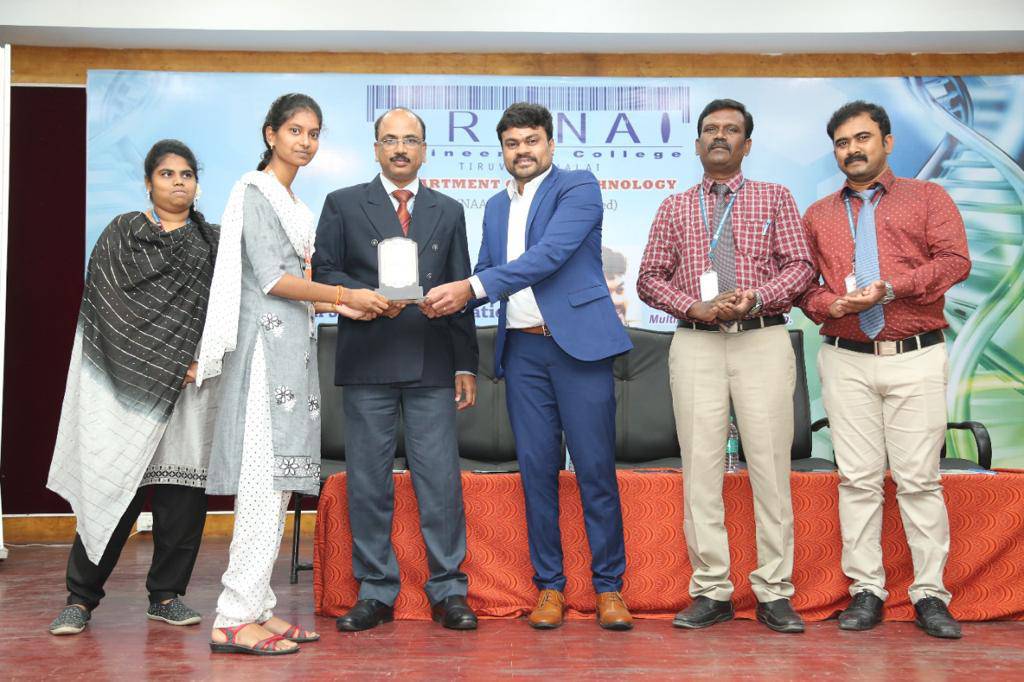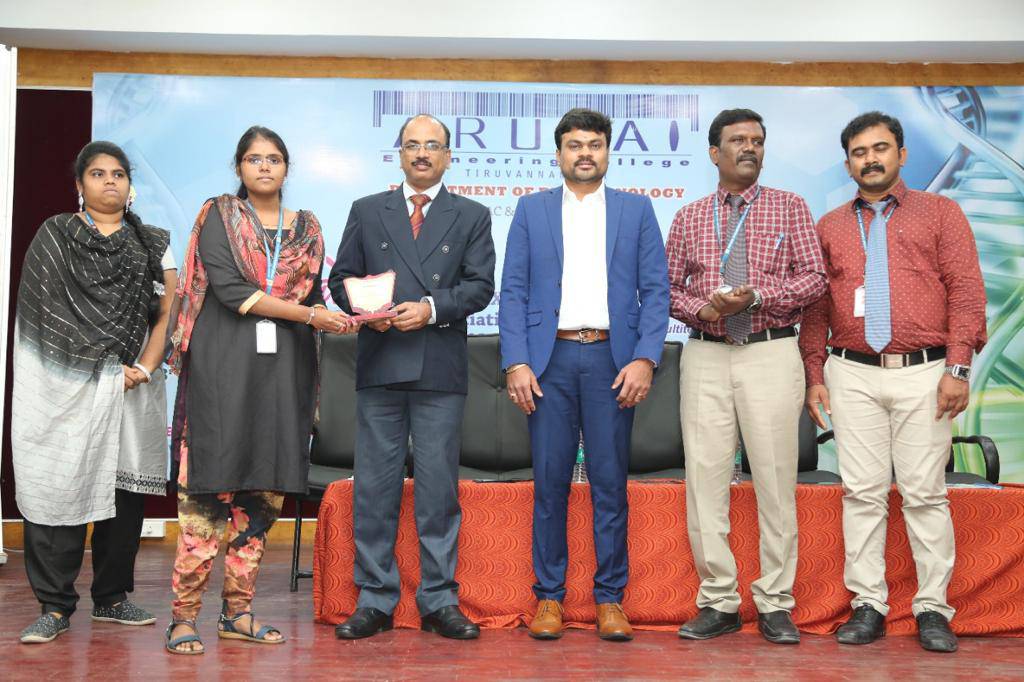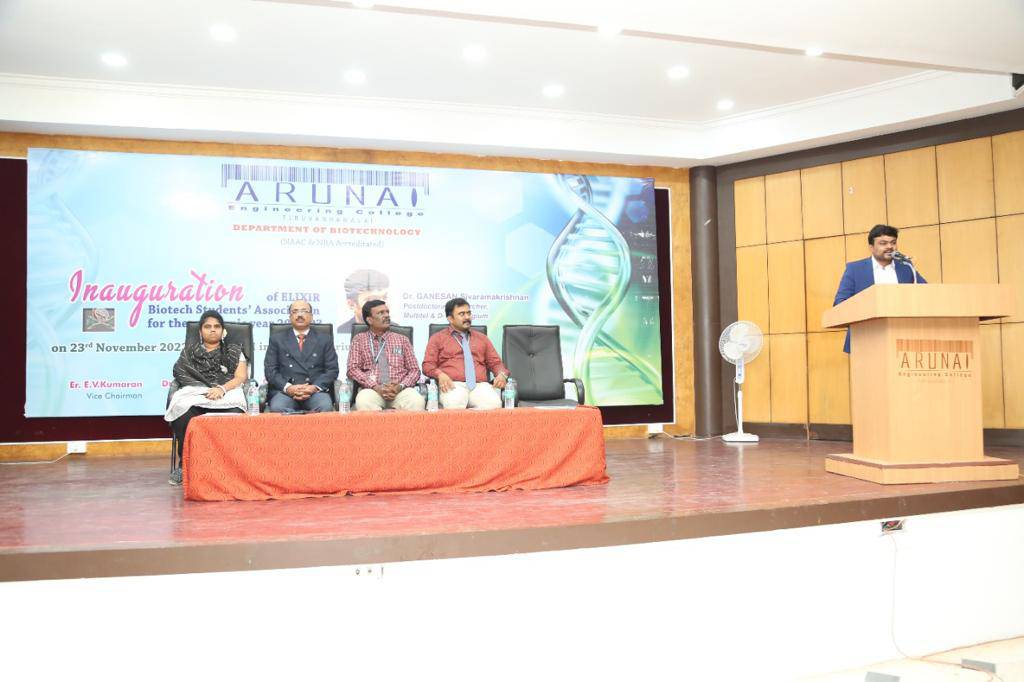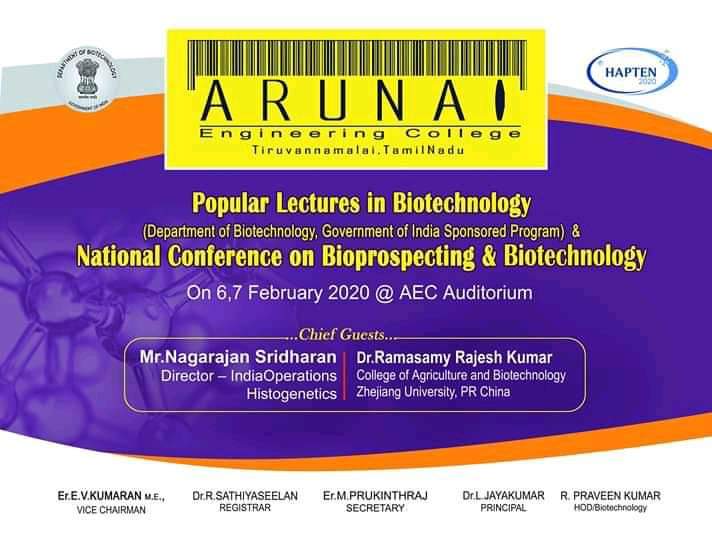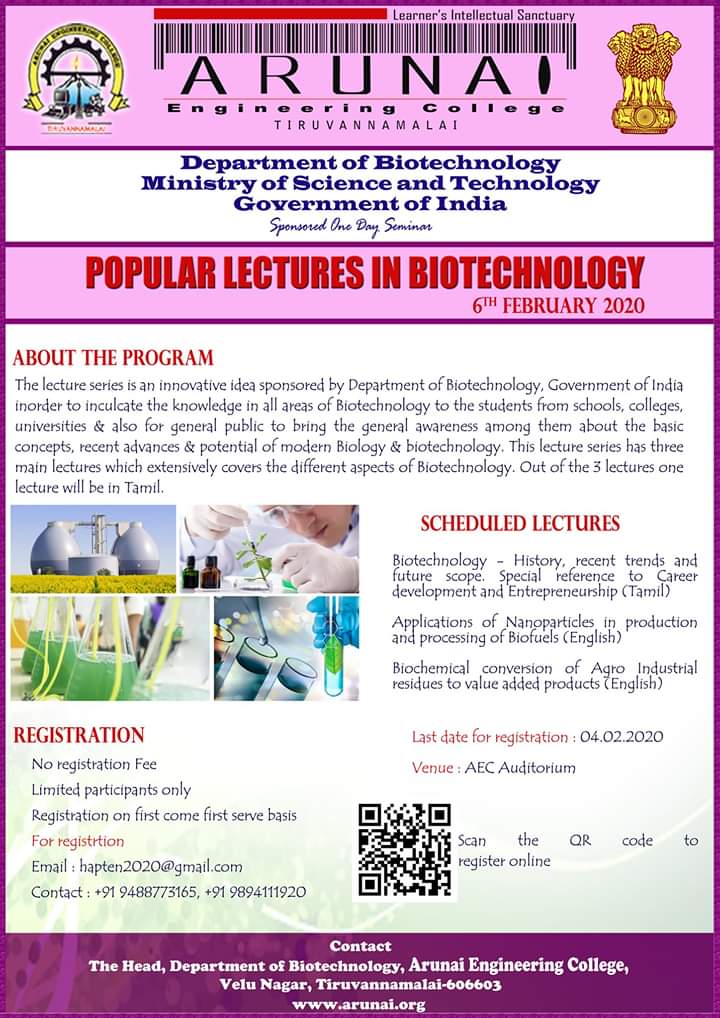Biotechnology
B.Tech - Biotechnology
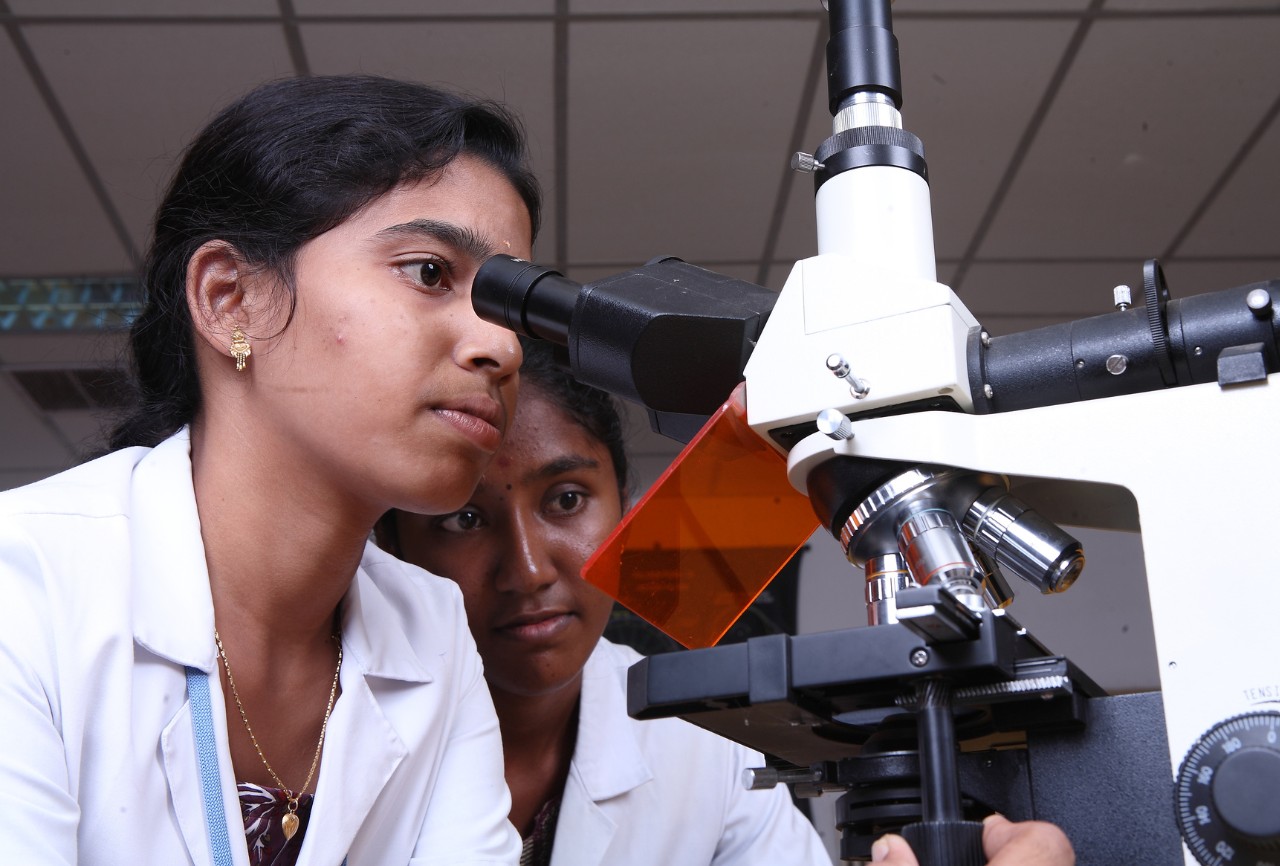
Introduction
The World of Biotechnology has relvolutionalised the evolution. It has engulfed the field of Agriculture, Industry, Environmental and Health care. To explore the potential of this sun rise technology, the seed was sown in the year 2002.The seedling germinated as Anna Bio Research Foundation and is manured by dynamic enthusiastic faculties. The department is offering UG (B.Tech) and PG (M.Tech) courses in Biotechnology affiliated to Anna University.
The undergraduate course, B.Tech – Biotechnology was started in the year 2002 with intake of 30 students, the intake was raised to 60 in 2005.300 students from 7 batches have been passed out from the department till now, among them more than 20% of the students have got admission for higher studies in abroad. Our students are pursuing higher studies in prestigious institutes like IIT, Anna University, etc., Our students are working in industries like Biocon, Reliance life science, etc.
To nurture the research activities and to enhance the manpower in Biotechnology the department has started postgraduate course, M.Tech – Biotechnology in 2012.
The laboratories of the department are equipped with high end instruments for Molecular biology, Biochemistry, Microbiology, Bioprocess, Downstream processing laboratory courses. It nourishes the student with analytical knowledge, hands on experience and soft skills. The department was ranked top ten among private institutions offering Biotechnology in India.
The department has highly enthusiastic and motivated faculty who are constantly involved in teaching and research.
Vision
To transform the department into a center of excellence in Biotechnology education, research and training, to improvise the manpower in various fields of biotechnology to meet the increasing global demand.
Mission
To train the students to be competent Biotechnologists who will be able to apply principles of life sciences and engineering to solve a wide array of problems in biotechnology. Graduates will be competent in core areas such as plant and animal biotechnology, bioprocess engineering, environmental biotechnology and biomolecular engineering.
Quality Policy
The department is enthusiastic in bringing out the hidden talents and to nurture their ideas by providing an incomparable platform to make them as successful biotechnologists, so that they can compete with others both in National and International context.
Programme's PEO's, PSO's and PO's
Program Educational Objectives (PEOs)
PEO1 : To prepare the students as a technologist in the relevant field to intensify their inquisitiveness for successful career in bio based industry that meet the needs of Indian and multinational companies and prepare them to be socially relevant Engineers for taking up technology leadership.
PEO2 : To develop the ability among students to synthesize data and technical concepts for application to industrial scale operations.
PEO3 : To provide opportunity for students to work as part of teams on multidisciplinary projects.
PEO4 : To provide students with a sound foundation in the mathematical, scientific and engineering fundamentals necessary to formulate, solve and analyze biotechnological problems and to prepare them for higher studies.
PEO5 : To promote student awareness of the life-long learning and to introduce them to professional ethics and codes of professional practice.
Program Outcomes (POs)
PO1 – Engineering Knowledge: Apply the knowledge of mathematics, science, engineering fundamentals and an engineering specialization to the solution of complex engineering problems.
PO2 – Problem Analysis: Identify, formulate, review research literature, and analyze complex engineering problems reaching substantiated conclusions using first principles of mathematics, natural sciences, and engineering sciences.
PO3 – Design / Development of solutions: Design solutions for complex engineering problems and design system components or processes that meet the specified needs with appropriate consideration for the public health and safety, and the cultural, societal, and environmental considerations.
PO4 – Conduct investigations of complex problems: Use research-based knowledge and research methods including design of experiments, analysis and interpretation of data, and synthesis of the information to provide valid conclusions.
PO5 – Modern tool usage: Create, select, and apply appropriate techniques, resources, and modern engineering and IT tools including prediction and modeling to complex engineering activities with an understanding of the limitations.
PO6 – The engineer and society: Apply reasoning informed by the contextual knowledge to assess societal, health, safety, legal and cultural issues and the consequent responsibilities relevant to the professional engineering practice.
PO7 – Environment and sustainability: Understand the impact of the professional engineering solutions in societal and environmental contexts, and demonstrate the knowledge of, and need for sustainable development.
PO8 – Ethics: Apply ethical principles and commit to professional ethics and responsibilities and norms of the engineering practice.
PO9 – Individual and team work: Function effectively as an individual and as a member or leader in diverse teams, and in multidisciplinary settings.
PO10 – Communication: Communicate effectively on complex engineering activities with the engineering community and with society at large, such as, being able to comprehend and write effective reports and design documentation, make effective presentations, and give and receive clear instructions.
PO11 – Project management and finance: Demonstrate knowledge and understanding of the engineering management principles and apply these to one’s own work, as a member and leader in a team, to manage projects and in multidisciplinary environments.
PO12 – Life-long learning: Recognize the need for and have the preparation and ability to engage in independent and lifelong learning in the broadest context of technological change.
Program Specific Outcomes (PSOs)
PSO1 : This programme provides a platform to absorb and grasp the fundamental concepts in the field of biology/biotechnology/biochemical/food/biopharmaceutical engineering thereby apply the knowledge as per the requirements of the industries and facilitating the students for higher studies.
PSO2 : This programme aids the students to attain basic problem solving skills in science and engineering thereby develop and design prototypes as per the requirement of industries.
PSO3 : Graduates would acquire better leadership qualities, moral and ethical values with a blend of knowledge in science, engineering and technology.
Alumni's Feedback
Nirmal kumar
Ayyappasamy Suddalaiadum Perumal
I learned how to be confident, perserverance and to listen out the details.
S. Annamalai
My college molded me into a complete person and enhanced myself.
